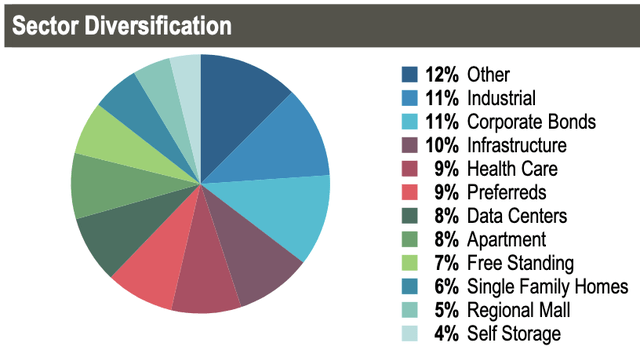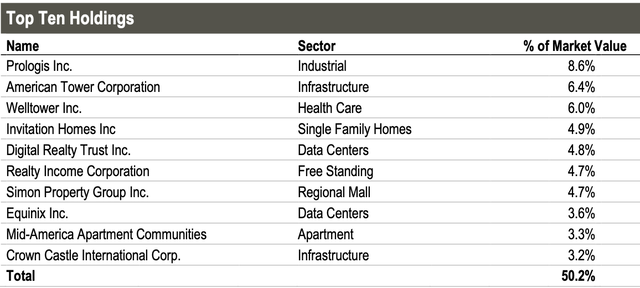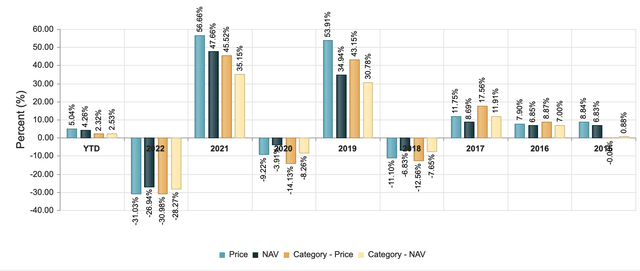If you’re looking for diversified exposure to Real Estate assets, you may want to check out Cohen & Steers Quality Income Realty Fund (NYSE:RQI).
RQI invests in several Real Estate sub-sectors, such as Infrastructure, Industrial, Data Centers, Health Care, and Apartments, in addition to Corporate Bonds.
RQI site
Fund Profile:
RQI is a closed-ended equity mutual fund, or CEF, which invests in stocks of companies operating in the real estate sector, including real estate investment trusts, or REITs. It primarily invests in growth stocks of companies across all market capitalizations. RQI has $2.4B in assets, with 206 holdings. Management uses 30.3% leverage to increase the fund’s returns, with a gross expense ratio of 1.91%.
Hidden Dividend Stocks Plus
Dividends:
RQI pays a managed, i.e., fixed, monthly distribution of $.08, going ex-dividend in the 2nd week of each month, and paying at the end of the month. At its 9/13/23 closing price of $10.91, RQI yielded 8.80%. Its 5% 5-year distribution growth rate is due to a year-end 2022 capital gain distribution of $.237/share, which it paid to allow the Fund to meet its 2022 distribution requirement for federal excise tax purposes.
Hidden Dividend Stocks Plus
Taxes:
As of 8/31/23, ~48% of RQI’s 2023 distributions have been attributed to Net Investment Income, NII, with the ~52% coming from Long Term Capital Gains.
RQI site
Debt:
81% of RQI’s financing is fixed rate, at an average rate of 1.7%, (a rate we haven’t seen in a long time), with an average term of 3.1 years. The 19% variable rate balance had a 6% rate, as of 6/30/23:
RQI site
Holdings:
As of 7/30/23, Prologis was RQI’s top holding, at 8.6%, up from 5% in July ’22, followed by American Tower (AMT), at 6.4%, down from 9%. Digital Realty (DLR) was a new top 10 addition.
RQI site
Performance:
Management reported a wide range of returns by property type for Q1-2 ’23.Data center operators led, benefiting from continued cloud demand and the start of an expected multiyear tailwind from artificial intelligence (“AI”). The Fund was overweight in the data center sector. Health care landlords, particularly senior housing landlords, also outperformed broader REITs; while Single Family REIT’s and Apartment REITs both benefited from good demand.
While certain sub-sectors have outperformed, RQI has lagged the broad Real Estate sector and the S&P 500 over the past month, quarter, year and so far in 2023.
Hidden Dividend Stocks Plus
Looking back further, RQI’s calendar year performance outperformed the Morningstar US CEF Real Estate category on a price and NAV basis in 2019 – 2021:
RQI site
Valuations:
CEFs’ daily valuations are calculated at the end of each trading day. As of the 9/12/23 close, RQI was trading at a 7.23% discount to NAV/Share, cheaper than its 1-, 3-, and 5-year average discounts of 4.96%, 4.08%, and 4.87%.
Buying CEF’s at deeper than historic discounts to NAV can be a useful strategy, due to mean reversion.
Hidden Dividend Stocks Plus
Parting Thoughts:
No one, including the Fed, knows yet when will the rate hikes stop, and, moreover, reverse course. At some point they’ll stop, and when they do, we’ll probably see a rise in real estate-related assets. The Fed’s next rate announcement is on September 20th.
We rate RQI a Hold for now, until there’s more clarity on rates.
If you’re interested in other high yield vehicles, we cover them every Friday and Sunday in our articles.
All tables furnished by Hidden Dividend Stocks Plus, unless otherwise noted.
Read the full article here



